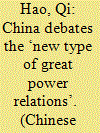| Srl | Item |
| 1 |
ID:
143679


|
|
|
|
|
| Summary/Abstract |
The proposal to forge a ‘new type of great power relations’ is one of the most important diplomatic innovations this Chinese administration has made. Although popular in official discourse, Chinese scholars diverge greatly on how to define the new concept. Debates focus on who the great powers are and what the new relations feature. All are rooted in the vagueness of this concept in official discourse. As the official interpretation of the concept is changing, the debate is also narrowing to that of the goals of the new relations. However, the revision of this concept makes it less practical due to its disconnectedness with the reality of China–US relations. The revised expression also diminishes the uniqueness of the new relations proposal, which implies that it may no longer be a feasible guide to China–US relations or an effective framework for academic studies on the power transition between existing and established powers.
|
|
|
|
|
|
|
|
|
|
|
|
|
|
|
|
| 2 |
ID:
147536


|
|
|
|
|
| Summary/Abstract |
Although Beijing maintains its diplomatic stance of ‘non-interference’ in the internal affairs of other countries, a debate has appeared in recent years on the sustainability of this principle. The various arguments fall into three general groups: abandoning the principle; strict adherence to the principle; and more flexibility in practice while maintaining the principle. Among them, the third, represented by new concepts like ‘creative involvement’ and ‘constructive involvement’, has attracted growing support in academic circles. After a close reading of certain representative arguments, this article suggests that the controversies among different analysts derive largely from divergent judgments on two interrelated, strategic issues: whether China should continue to keep a low profile in global affairs, and China’s relations as a whole with the Western-led international society. The non-interference debate thus reflects the conflicting orientations that underlie the worldview of contemporary China, and the non-interference dilemma Beijing faces. The impact of the debate on Beijing’s policy is difficult to ascertain, but it is noticeable that in spite of its unquestioning commitment to sovereignty and non-interference, which will not change in the short run, the Chinese government is nevertheless moderately adjusting its policies. A loose pragmatic consensus among scholars both reflects and brings about this change.
|
|
|
|
|
|
|
|
|
|
|
|
|
|
|
|